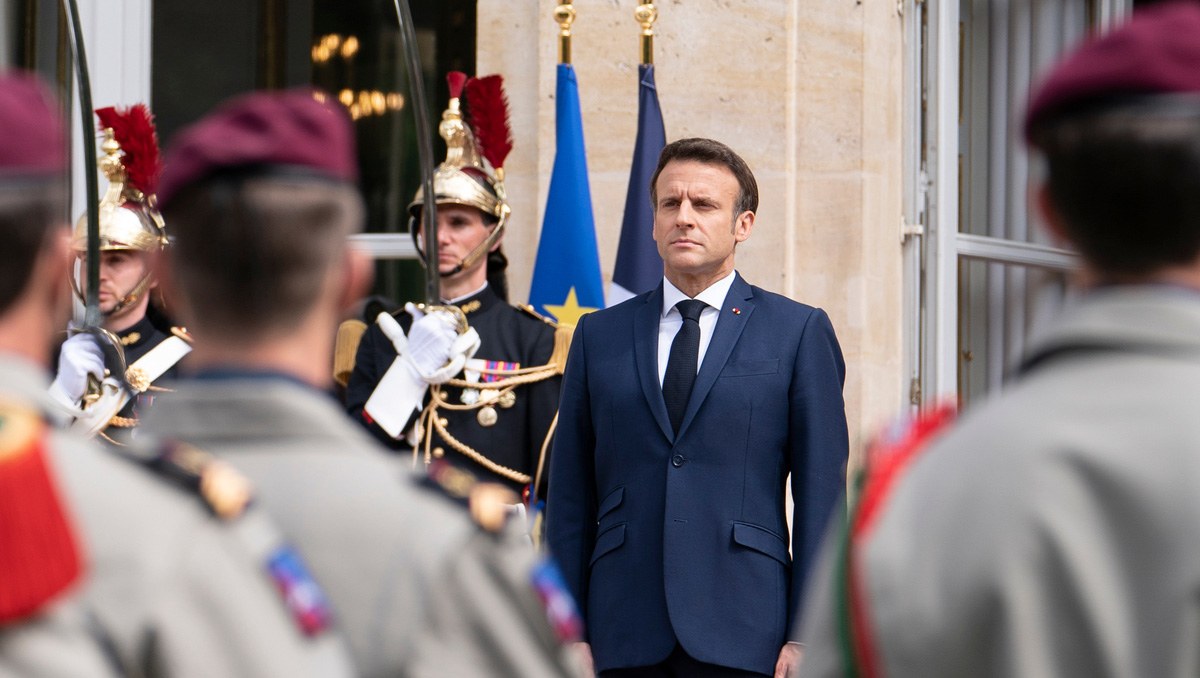In a rousing speech ahead of Bastille Day, the French president promised to double military spending by 2027 – three years ahead of schedule.
This month, in advance of France’s national holiday to celebrate the fall of the Bastille on 14 July in 1789, President Emmanuel Macron declared that France was accelerating its defence spending.
You’re out of free articles for this month
France had previously planned to achieve a doubling of its 2017 defence budget by 2030, but the plan now is to hit that figure – a total of €32 billion – by 2027.
“While we had planned to double the budget by 2030, we will double it by 2027,” President Macron said, speaking to a crowd of senior defence figures.
“To this end, an update of the military programming law will be presented in autumn that will foresee the effort we will have to make until 2027 under my responsibility, and I am appealing to the responsibility of the nation.”
To achieve this, France will add €3.5 billion to the current military programming law in 2026, and an additional €3 billion in 2027. President Macron’s justification is obvious. “If our freedom has a price,” President Macron said, “this is it.”
“We are the generation that did not experience the war, determined that our children know nothing but peace. But let’s be clear, we no longer have the peace dividends that our parents benefited from.
“That’s over,” President Macron said.
What President Macron said next began with a similar refrain to what nearly every world leader has been saying since the Russian invasion of Ukraine in 2022.
“Without a doubt, never since 1945 has our freedom been so threatened and never to this extent,” President Macron said.
Politicians and analysts alike commonly refer to the current state of global politics as “the most dangerous strategic environment since World War 2”. However, President Macron went further still in how France plans to respond to this environment.
“Let’s be clear, to be free in this world, we must be feared,” President Macron said.
“To be feared, we must be powerful. And for that, the nation must be stronger.”
It’s worth noting that, as a nuclear power, France is unique in that it has a first strike doctrine. It’s more than happy to fire a “nuclear warning shot” at any adversary that even looks like it might threaten its borders. And President Macron considers that not scary enough when it comes to deterring its enemies.
President Macron goes on to lay out his – and Europe’s at large – thinking, namely that America can no longer be trusted and that China and Russia are threats that need to be actively defended against. Only a sovereign and strong Europe can stand up to what is rapidly emerging as a new and uncertain world order.
“While our American ally displays a willingness to disengage, new uncertainties have been created for us and so many allies,” President Macron said.
“Do we want, once and for all, to take our security and that of the continent into our own hands and build a true European pillar of NATO?”
President Macron’s answer was a clear yes.
Europe first
The French president outlined his thinking and the country’s direction in more detail in the foreword to the recently released National Strategic Review.
Russia, President Macron said, is the foremost driver of French strategic thinking, and the threat that the nation’s military must face. Similarly, the rise of what he calls “the uninhibited use of force” in conflict zones elsewhere in the world, such as in the Middle East and Africa, is another key element of French thinking.
He also stated that France’s “tradition of independence” leaves it in a unique position to rise to the challenge of the times and be a key guarantor of wider European independence.
However, it is the technological revolution, unfolding in real time on the battlefields of Ukraine, that must serve as a wake-up call.
“The fight being waged by the Ukrainians reminds us of the constants of war: the thousands of lives lost every day at the front, the essential unity of a nation to hold out, the strategic role of industry and international solidarity,” President Macron said.
“But this war is also a war of disruption, where drones have become an extension of each combatant, where space communications connect every soldier, where cyber manoeuvres and electronic warfare determine the success of operations. It is a war that every citizen observes on social media without realising the propaganda operations that are developing there. Our thinking will have to change profoundly to incorporate these realities.”
In short, it’s the war that France one day expects to fight – and sooner, rather than later.
